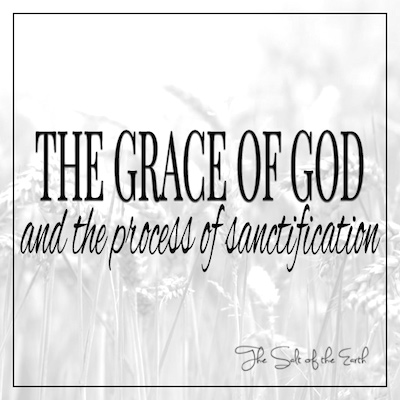What is the difference between the law and grace in the Bible? And what is the relation between the law and grace? It’s important to know that the will of God existed before the coming of the law of Moses. Therefore sin already existed before the coming of the law. Sin is the will of the devil and is the exact opposite of the will of God. God was very clear about His will. God told Adam what to do and what not to do. And God never stopped doing that throughout generations. God didn’t make a secret of His will, but God revealed His will to the people, by giving His commandments. But it was up to the people, what they decided to do with His commandments.
The people had been given a free will and were responsible for their lives
The people had been given a free will and were responsible for their own lives and their final destination, and not God. Through rebellion and disobedience of fallen man to God, the people brought the wrath and judgment of God upon themselves. The end of the unity of humanity, by the fall of the tower of Babel, the destruction of the earth and every living thing by the flood in the time of Noah, and the destruction of Sodom and Gomorrah all happened before the law of Moses entered. Even the covenant between God and Abraham and His Seed (uJesu) and as a sign the circumcision in the flesh on ngosuku lwesishiyagalombili, already existed before the coming of the law (Genesis 17:14-17, KwabaseGalathiya 3:16).
The law is a form of knowledge and the truth
The law of Moses with all God’s commandments, imithethonqubo, sacrificial laws, dietary laws, amasiko, and feasts came after several hundred years after the creation and was meant for fallen man, who belonged to Gods carnal covenant people Israel. They had the privilege to belong to God’s carnal covenant people, through their natural birth, which was actually also God’s grace. The carnal circumcision on ngosuku lwesishiyagalombili was a sign, that they belonged to God’s covenant people and that they could walk in God’s covenant and that He was with them.
 God revealed His will by giving His people the law of Moses and because His will was revealed, sin was revealed. Sin and death reigned in fallen man and because the law was meant for fallen man, the law was called, the law of sin and death.
God revealed His will by giving His people the law of Moses and because His will was revealed, sin was revealed. Sin and death reigned in fallen man and because the law was meant for fallen man, the law was called, the law of sin and death.
I law of sin and death entered and was meant as a schoolteacher to keep and protect God’s people until the promise; Jesus Christ would come.
Ngenxa yeqiniso, that God’s will was revealed through the law, and that through the law the spiritual was revealed to the carnal people, the law was a form of knowledge and the truth (AmaRoma 2:20).
God’s people had lived for years under the authority of Pharaoh and were used to the culture, habits, customs, gods, and rituals of Egypt. That’s why they had to renew their mind, which was formed after the knowledge and wisdom of Egypt, and that’s exactly what God did through His Word.
Through His words, which God had given to Moses, God not only made His will known to His people but by revealing His will and the truth, He exposed sin to His people.
Thou shalt not….…..
Since God’s people were carnal and therefore lead and ruled by their flesh, lapho kubusa isono nokufa, God didn’t say: “Thou shalt…..”, but God said: “Thou shalt not….”. Because the sinful carnal nature of fallen man, always wants to do those things that go against God’s will. The sinful carnal nature rules in fallen man and that’s why sin reigned as king in their lives.
 I old carnal man, who possesses the sinful nature and in whom sin reigns as king in his life, doesn’t want to love God and submit himself to His will. The old carnal man doesn’t want to submit to God, uJesu; iZwi, uMoya oNgcwele, abazali, teachers, employers, managers, and all authority in general, but is rebellious. The old carnal man loves himself and doesn’t allow anyone to dictate him what to do, because he decides what to say and do.
I old carnal man, who possesses the sinful nature and in whom sin reigns as king in his life, doesn’t want to love God and submit himself to His will. The old carnal man doesn’t want to submit to God, uJesu; iZwi, uMoya oNgcwele, abazali, teachers, employers, managers, and all authority in general, but is rebellious. The old carnal man loves himself and doesn’t allow anyone to dictate him what to do, because he decides what to say and do.
The flesh of the carnal man is self-seeking, jealous, envious, prideful, greedy, and lies, steals, inhlebo, yenza ukukhwabanisa, and adultery, and is not loyal but breaks covenants, and only does those things, when it suits him and benefits him.
Only by keeping the law and doing the works of the law, the old carnal man, who belonged to the fallen generation, could be saved. The old carnal man had to work his own salvation by keeping the law (commandments, amasiko, sacrifices, amadili, njll.).
God had given everyone a free will, and although they belonged to God’s covenant people through natural birth, God didn’t bind anyone and didn’t force anyone to keep the law, but God let them decide to keep Imiyalo Yakhe and obey God and remain His people or not.
The law could only make atonement and deal with sin temporarily
Although the law represented the will of God and revealed sin, the law was not able to take care of the sinful nature of fallen man. The law could only reveal sin, deal with sin through (ukufa)punishments and remove evil among the people, and temporarily make atonement for the sins of man through the blood of animals. But the law was not able to deal with the sinful nature of the flesh, which produced sins and iniquities and therefore the law was not able to redeem carnal man from his sinful nature, which leads to death.
The sacrificial laws could only temporarily make atonement for the sins and iniquities of the people, which derived from the sinful nature of fallen man. That’s why the sacrificing of animals to make atonement for the sins and iniquities of the people, had to be done on a regular and yearly basis.
Because after the atonement, the old carnal man was still trapped in his sinful nature. Nothing was changed to the position of fallen man, and therefore man would fall back into sin.
The law of Moses was not able to restore and complete man, because, despite all the sacrifices of animals, the sinful nature was still present in the flesh (IsiHebheru 10:1).
The law was given by Moses,
but grace and truth came by Jesus Christ
John bare witness of Him, and cried, ethi, Nguye lo engangikhuluma ngaye, He that cometh after me is preferred before me: ngokuba wayekhona ngaphambi kwami. Futhi ekugcwaleni Kwakhe sithole sonke, and grace for grace. For the law was given by Moses, but grace and truth came by Jesus Christ. No man hath seen God at any time; the only begotten Son, which is in the bosom of the Father, He hath declared Him (UJohane 1:15-18)
Jesus Christ came to the earth and preached the truth and brought the Kingdom of God to God’s people. Jesus represented the will and the heart of God, which is the same will of God, that is written in the law and already existed before the law. That’s why Jesus didn’t come to destroy the law but to fulfill the law (Mathewu 5:17). Intando kaNkulunkulu was also the will of Jesus and is still the will of Jesus.
Despite the many temptations in the flesh, Jesus stayed obedient and loyal to God and walked in His commandments, and therefore Jesus walked after the Spirit.
Jesus gave His life for fallen man; the sinner. He became a sin offering and the atonement for fallen man.
 Through His blood, which was shed in the insimu yaseGetsemane, at the whipping post, and at isiphambano, Jesus made atonement for fallen man.
Through His blood, which was shed in the insimu yaseGetsemane, at the whipping post, and at isiphambano, Jesus made atonement for fallen man.
Jesus descended into Hell and through His resurrection from the dead, Jesus conquered death and took the keys, which represented the authority of death and Hell, and ascended into the heavens and took place at the right hand of God the Father to rule as King.
NgoJesu’ perfect work of redemption, a new covenant came into being, that was sealed by His blood. By His perfect work of redemption for fallen man, Jesus showed God’s love for the world and brought God’s grace to man.
Wonke umuntu, who believes in Jesus Christ, iNdodana kaNkulunkulu ophilayo, and His work of redemption for fallen man, has the ability to phenduka and through ukuvuselelwa be redeemed from the sinful nature in the flesh of fallen man and be saved from death.
You can no longer be justified by your own works and by keeping all kinds of rules, imithethonqubo, and rituals like in the Old Covenant, which was meant for the old carnal man, who lived after the flesh. But you can only be made righteous through the grace of Jesus Christ and through faith in Him. Jesus has fulfilled the law and accomplished His work to redeem fallen man from sin and death. Jesus went into Hades and was raised from the dead so that the old carnal man (inyama) could die in Him and the new man (umoya) could be raised from the dead in Him.
If you are born again and your spirit is raised from the dead, ngamandla kaMoya oNgcwele, then you are under grace and not under the law. Because you didn’t have to do anything to be made righteous and holy
The sacrifice of Jesus Christ and His blood dealt with the sin nature of the flesh
What the sacrifices of animals, imithethonqubo, and rituals of the law, that were part of the Old Covenant couldn’t do, the sacrifice of Jesus, by Whom a New Covenant came into being, could. That’s why, His sacrifice was sufficient once and for all, and didn’t have to be repeated every year. Because the sacrifice of Jesus Christ and His blood has the power to deal for once and for all with the flesh, which contains the sinful nature, which makes a person a isoni and keeps a person in the bondage of sin ((IsiHebheru 10:14).
When a person enters into the New Covenant by faith in Jesus Christ and as a sign is circumcised in Jesus Christ through regeneration and by the renewing of the heart, the person is made holy and righteous in Him.
Ngokuvuselela, the spirit of man is raised from the death
The spirit of man, which was death through sin and therefore separated from God, is raised from the dead by the power of the Holy Spirit. By the indwelling of the Holy Spirit, Intando kaNkulunkulu, which is the same will that is represented in the law, is written in the hearts of those, who have been made righteous in Jesus Christ
The fallen man, or in other words, the old carnal man, who was a slave of the devil and was ruled by sin and death, has become a new creation; a new man. The new man is no longer a sinner; indodana kasathane, but has become a son of God; a saint (IsiHebheru 10:15-18).
Since the old carnal man (inyama) has died in Jesus Christ, the person is no longer bound to the law of sin and death, obusa enyameni. But by the resurrection of the new man (umoya), the person is bound by the spirit to the law of faith and life.
Love God above all
Kodwa… the fact that through regeneration, you are no longer under the law but under grace, unayo, just as the coming of the law of Moses, no effect on the will of God. The commandments that God gave and represent the moral part of the law, which can be summarized in two commandments, namely: love God above all with all your heart, ingqondo, umphefumulo, and strength and love your neighbor as yourself, are still valid (Maka 12:29-31).
Uma ngempela love God your Father above all and you want to live with Him, then you shall do what He has commanded you to and you shall live after His will; after His commandments. Because by listening to Him and His Word and by keeping and walking in His commandments, which are also the commandments of Jesus, you show Him that you love Him.
Ngoba labo, who are born of Him, will love Him and therefore they will listen to Him and do His will.
A new heart of flesh in which God’s will is written
Behold, izinsuku ziyeza, isho iNkosi, lapho ngiyokwenza isivumelwano esisha nendlu ka-Israyeli nendlu kaJuda: Hhayi ngokwesivumelwano engasenza nawoyise mhla ngibabamba ngesandla ukubakhipha ezweni laseGibithe.; ngoba abazange bahlale esivumelwaneni Sami, futhi angizange ngibacabangele, isho iNkosi. Ngoba yilesi isivumelwano engizasenza lendlu kaIsrayeli ngemva kwalezonsuku, isho iNkosi; I will put my laws into their mind, futhi uzibhale ezinhliziyweni zabo: mina ngizakuba nguNkulunkulu wabo, bazakuba ngabantu kimi: Futhi kabayikufundisa ngulowo lalowo umakhelwane wakhe, yilowo nalowo umfowabo, ethi, Yazi iNkosi: ngoba bonke bazangazi, kusukela komncinyane kusiya komkhulu. Ngoba ngizakuba lesihawu ukungalungi kwabo, nezono zabo nobubi babo angisayikukukhumbula (IsiHebheru 8:8-12)
God promised that He would write His law or in other words His commandments, which represents His will in the hearts of those, who have received a new heart of flesh through regeneration (UHezekeli 11:19-20, 36:25-29, Jeremiya 31:33-34, 2 AbaseKorinte 3:3). And that’s exactly what happened when the Holy Spirit came. Ngoba 50 ezinsukwini emva kwePhasika, the Lord made His will known to His people, by giving them the law via Moses, futhi 50 ezinsukwini emva kwePhasika the outpouring of the Holy Spirit took place.
Through regeneration in Christ, the old stony heart of the carnal man is being replaced by a heart of flesh in which the Holy Spirit lives. That’s why, the law of Moses was written on tablets of stone, which represented the heart of stone of the old carnal man (funda futhi; “Why did God write His law on tables of stone?”)
The will of God is the will of Jesus
The commandments of God are the same commandments as Jesus’ commandments. Jesus even sharpened God’s commandments and added commandments (Funda futhi: “The commandments of God vs. imiyalo kaJesu“). But the sacrificial laws, dietary laws, amadili, amasiko, njll. that are written in the law of Moses and had to be kept by fallen man, who belonged to God’s carnal covenant people (Israyeli), in order to be made righteous, have become obsolete. Because it was carnal and was just a shadow of what had to come (Kol 2:16-17). They have been replaced in Christ, by His perfect work of redemption and by His blood and have become obsolete.
 No one can earn a righteous status by his works and by keeping the commandments, dietary laws, sacrificial laws, imithethonqubo, amasiko, and feasts of the law of Moses.
No one can earn a righteous status by his works and by keeping the commandments, dietary laws, sacrificial laws, imithethonqubo, amasiko, and feasts of the law of Moses.
The law of sin and death doesn’t reign in the new man, because the new man has crucified his flesh in Christ and therefore no longer walks after the flesh, but after the spirit
As soon as you repent by faith in Jesus and become born again in the spiritual realm, you have become a new creation.
The natural law of Moses, which was meant for the old carnal man; indoda ewile, lapho kubusa isono nokufa, has no authority over the new man because the flesh of the new man is crucified in Jesus Christ.
Ngokuvuselela, you have become born again in the spirit and have become a son of God and received His Holy Spirit, Who represents His will. That’s why the natural law of sin and death, that reigns in your sinful flesh, doesn’t reign anymore, but the spiritual law of faith, umusa, and life that reigns in the spirit.
Are you under the law or under grace?
You no longer live under the law, since you have laid down your sinful flesh, in which the law of sin and death was operative, but you live under grace because through the sacrifice of Jesus Christ you have been redeemed from death and have become a new creation; indodana kaNkulunkulu.
Your spirit, who was dead and separated from God, has been raised from the dead by the power of the Holy Spirit. Not by your works and not because you deserved it, but because of God’s great love and His grace and His work. You didn’t have to do anything about it.
Kodwa manje, that by His grace and through the circumcision in Christ you have been made holy and righteous and belong to God’s people and have received God’s nature, you shall walk after God’s will in righteousness and not after the will of the devil in sin.
‘Yibani usawoti womhlaba’


